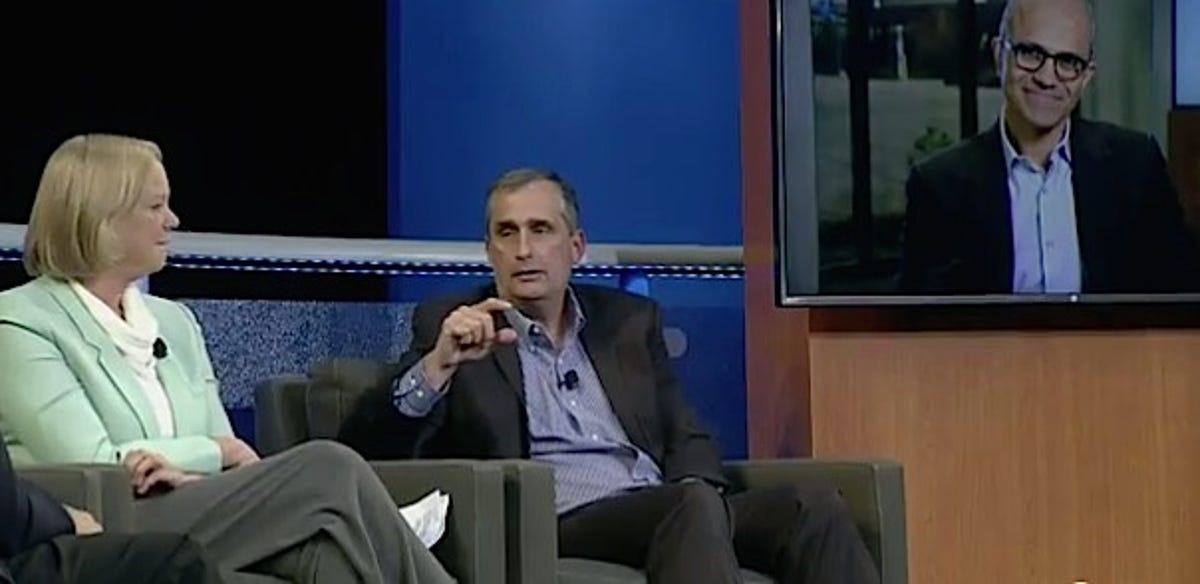
Hewlett-Packard/Screenshot by Brooke Crothers/CNET
Are we ready, willing, and able to deal with the flood of information pouring in from phones, tablets, glasses, clothes, bracelets, and watches?
Hewlett-Packard CEO Meg Whitman, Intel CEO Brian Krzanich, and Microsoft CEO Satya Nadella tried to answer that question at the end of a panel session earlier this week at Hewlett-Packard’s Discover conference. The discussion was streamed live Wednesday.
As a backdrop to the discussion, HP, in a completely unrelated session on Tuesday, seemed to underscore the coming data overload when Whitman announced that HP is trying to reinvent the compute paradigm with a project it calls The Machine.
Rising data volumes from “cloud computing, the Internet of Things, mobile networks, machine to machine computing” are generating unfathomable and unmanageable amounts of data and a new computing architecture is necessary to deal with it, she said.
Truth is, all three CEOs have a large stake in seeing a proliferation of new computing devices, whether they be smartphones with more sensors and more intelligence, or a variety of connected wearables that fall under the rubric of the “Internet of Things,” or more servers to store the data.
The problem — to state the obvious — is: if the data isn’t succinct, highly personal, and easily digestible, it’s just heaping more extraneous data on top of the already-high data loads that many of us deal with daily.
The other problem is that tech conferences rarely ask these hard questions: the assumption always being that more devices, more data is intrinsically good. (And note that this question was posed at the very end of a session, as almost an afterthought.)
But, as their answers show, more data from more devices isn’t — or at least, shouldn’t be — the goal.
Whitman offered probably the most candid answer.
“I wonder if we’re wired for this? [If] the human brain and our emotional state can actually sustain this? I feel a lot more stressed than I did 10 years ago because I’m always on. I wake up in the middle of the night, reach over for my phone, and I check my email. This is probably not a good thing,” she said.
Buried within Krzanich’s and Nadella’s responses were admissions that the problem of data overload isn’t solved yet.
“[If] it’s cumbersome or difficult for you to get the data…to understand how it operates, then that is not adding to your life but actually is a burden. It’s a problem we have to solve but I don’t think we’re all great at it yet,” Krzanich said.
“In it’s current form, it is inundating,” added Nadella.
Related stories
But all three companies are in the business of providing solutions, not just adding to the load. And Krzanich asserted that we are ready for more data.
“We are absolutely wired for this,” according to Krzanich. “If you think about the way the brain works. The ability to take in data at phenomenal rates.”
“[We have to] make it a more personal experience. If [the devices and software are] smooth and seamless, you’ll appreciate them,” he said.
Nadella offered an example of how it doesn’t necessarily have to be more information but better information.
“I was coming over to the studio today to join this meeting and my intelligent agent — we have this thing called Cortana which runs on our phones — and it basically woke up and said, ‘hey the traffic is crawling, you may want to leave now.’ Being able to have something like that [is helpful].”
The solution is to streamline the growing stack of data feeds that can potentially lead to overload, said Nadella.
“I don’t want to be triaging my email and [then] add my Facebook feed, and add to that my SMS,” Nadella said. “What’s scarce is attention. In a sea of data and information [it’s important] to be able to have someone help you, I think this is the world we need to get to. Solutions have to come and I think we will definitely will break through,” he said.
Whitman closed on a high note. In the end, “we’re pretty adaptive,” she said.



